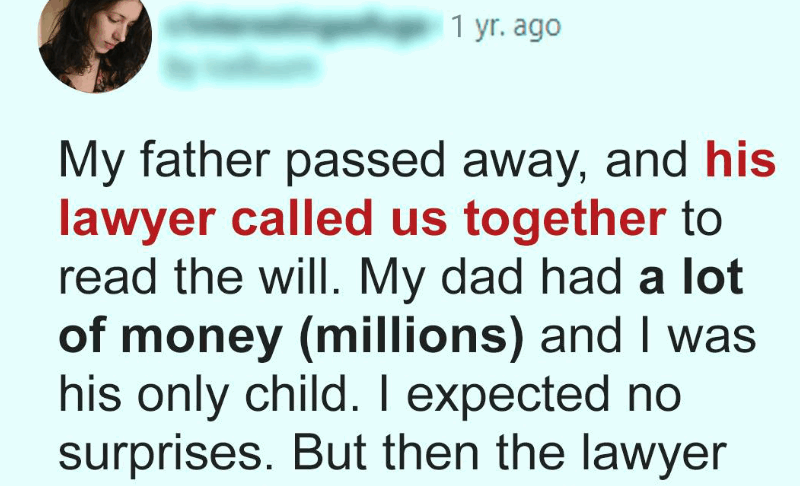When I was in first grade, my friend Rina often had intense outbursts.
We planned a sleepover, and I drifted off to sleep in her cozy bedroom.
In the quiet of the night, I woke up in a strange bed, next to her father.
I was utterly bewildered. He said softly, “Hey, kiddo, you wandered in here sleepwalking. It’s all right. Head back to bed.”
I felt groggy and uneasy. I had no memory of moving. His voice was steady, soothing, but the moment felt off. The room was unfamiliar—not like my own, no bright colors or stuffed animals. It was dim, with a faint scent of cologne mixed with something sharp, like stale coffee.
I sat up, murmuring an apology, and he calmly led me back to Rina’s room. She was still sound asleep, sprawled across her bed, one arm hanging over the edge.
Sleep eluded me for the rest of the night. I lay awake, staring at the ceiling until dawn broke and birds began to chirp. I kept the experience to myself, not even telling my mom.
Perhaps I didn’t fully grasp what had happened. I wasn’t hurt or touched, only profoundly puzzled.
As a child, you tend to trust that adults have everything under control. I convinced myself I might have sleepwalked, that it was simply an odd adult situation. He hadn’t raised his voice or seemed upset. Yet, his hand rested on my back a moment too long as he guided me out, and that small detail stuck with me, like a splinter under my skin.
Time passed. I never returned to Rina’s house. I told my mom I preferred not to sleep over there anymore, offering a vague excuse. My friendship with Rina faded gently, and we ended up in different classes the following year.
Years later, in middle school, Rina moved away. I didn’t hear of her again until high school. As juniors, I spotted her in an Instagram story at a lively house party. Her hair was a vibrant blue, her eyeliner bold and fierce. She had a wild, defiant look, flipping off the camera.
A month later, she appeared in a local news article.
The headline read, “Teen Hospitalized After Domestic Incident.” No names were mentioned, but I recognized her house in a grainy photo. Soon after, whispers spread that her father had been arrested for “disturbing behavior.”
I still kept silent about that night.
It wasn’t until I became a mother that everything shifted.
My daughter, Lali, was six when she was invited to a sleepover at her classmate Maribel’s house. Maribel was a kind child, and her mom was always warm and talkative at school pickups. Yet, when the invitation came, a chill settled in my chest.
I initially agreed, but that night, panic overwhelmed me. Sitting on my bed, staring at Lali’s packed backpack with her pajamas and stuffed turtle, I couldn’t bring myself to let her go. I canceled the sleepover.
That same night, I confided in my husband, Rehan.
He’s a steady, compassionate man, never one for dramatics. In a hushed voice, I shared the memory of waking up in a grown man’s bed at six years old.
Rehan listened quietly, letting me speak without interruption. When I finished, he simply said, “You made the right call keeping Lali home.”
That moment opened something within me.
I began writing to sort through my thoughts. I didn’t intend to make a fuss or even label what had happened. It felt like a lingering weight I needed to release.
The story poured out in one sitting. I saved it in a password-protected Google Doc, with no plans to share it.
One evening, while browsing Facebook, I saw a post from a woman in our community. She described her niece being followed in a grocery store parking lot, urging others to stay vigilant. The post had gained some attention.
Moved by her words, I left a brief comment: “Something happened to me as a kid that only made sense when I became a mom. Always trust your instincts.”
The response was overwhelming.
People thanked me, sharing their own vague, unsettling childhood memories—moments that left them uneasy but without clear evidence. Some admitted to feeling foolish for years.
That night, something in me changed, like a weight lifting.
The following week, I joined a writing group at the local library. It was a small circle of five women, meeting every Thursday. I hesitated to share my sleepover story but eventually read it aloud.
One woman, Flavia, with a sharp jawline and a keen memory, listened intently. After I finished, she asked, “What was the family’s last name?”
I told her. She fell silent.
The next week, Flavia brought a yellowed newspaper clipping from 2009.
The headline read, “Man Faces Charges in Delayed Assault Case.”
It was Rina’s father.
My heart sank.
Flavia shared that he’d briefly taught at her cousin’s school before being fired under mysterious circumstances. The name Halstrom stuck with her because her cousin had called him “a weirdo.”
I wasn’t alone in my experience.
I felt a surge of anger that he’d escaped accountability for so long, alongside relief that someone had finally spoken out.
I debated whether to come forward. It had been over two decades, and I had no tangible proof—just a hazy memory from childhood.
But something urged me to find Rina.
I tracked down her cousin on social media and sent a message, expecting no reply.
Three days later, Rina called.
Her voice was deeper, weary, but she remembered me. I explained why I’d reached out. A long pause followed.
Then she said, “I always wondered if something happened to you too.”
Those words struck me deeply.
Rina shared that she’d testified against her father. She’d cut contact with him five years earlier, after therapy and a personal crisis. The court case involved another victim, but her testimony had strengthened the case.
I admitted I wasn’t sure if my story could contribute anything meaningful.
She replied, “Even your statement, even if it’s not enough for court, helps show there’s a pattern. It helps people believe me.”
So I acted.
I wrote a detailed affidavit, recounting every detail I could recall: the disorienting moment of waking up, his calm voice, his hand lingering on my back, the confusion that followed.
It felt insignificant, but it wasn’t.
The case grew.
Two more women came forward after me, one from a summer camp in 1996.
Rina’s father is now in prison, sentenced to at least fifteen years.
I still don’t know the full truth of that night. I may never know. But I know what didn’t happen: he didn’t harm my daughter, Lali, or countless others who might have crossed his path if the silence had persisted.
Here’s the part that moves me to tears:
Months after the trial, I received a handwritten letter from Rina.
She was in a program to become a counselor for trauma survivors. She wrote that she might not be here today without the few who believed her. My small Facebook comment, she said, was the first time she felt she wasn’t alone.
Tucked inside the letter was a drawing—a sketch of two little girls in bunk beds, one peering over the edge, smiling at the other.
I keep that letter in my nightstand.
What did I learn?
Trust your instincts, especially when they’re quiet but persistent.
Sometimes, the smallest details—a strange glance, a touch that lingers, a moment that feels wrong—can point to a larger truth.
You don’t need the full picture to speak out. Even a single voice can light the way for others.
Our stories, even the incomplete ones, carry weight.
If this story resonates with you, share it. Someone out there might need to know they’re not alone, not crazy, and not too late.




